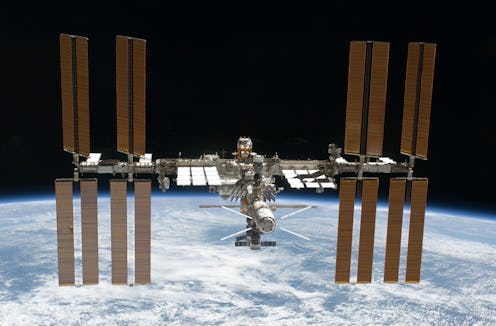
Sixty years ago, the formation of NASA — the National Aeronautics and Space Administration — launched humanity into space. President Dwight D. Eisenhower signed the agency into existence and President John F. Kennedy ignited the fire that would drive us to the moon. Now, six decades later, NASA is celebrating its birthday in a number of ways, one of which is through the documentary Above and Beyond: NASA’s Journey to Tomorrow. Directed, produced, and narrated by JFK's niece, Rory Kennedy, the doc is hitting big screens for a two-day special event this fall that any space and science lover should be sure to catch.
A special theatrical showing of the film will hit movie theaters around the country on Sept. 29 and Oct. 3, 2018. On Oct. 13, the film heads to the Discovery Channel, but seeing this doc, with its footage of rocket launches, space walks, high-def Hubble images, and our rotating planet, on the big screen is definitely a plus. (Tickets are available now.) Above and Beyond tracks NASA's 60-year history and chronicles how America's space agency has influenced major aspects of our nation and our planet. As Kennedy says in the film, the space race was, "More than beating the Soviet Union, more than planting the flag, it was about discovery." By examining its role in international relations, science, and the environment, the doc shows where NASA has been but also where they're heading in the future.
At the Television Critics Association press tour back in January, NASA Chief Scientist Ellen Stofan, who worked as a consultant on the film, said that the doc wasn't just a way of honoring NASA's history, but also a way of looking forward. "If you look at the next 20 to 30 years, it’s going to make everything we’ve done so far seem really small," Deadline reported. "We're on the verge of going to Mars to search for potential life and out to the moons of Saturn. We’re getting ready to send humans to the moon and Mars after that, so fasten your seat belts."
For Kennedy, who was nominated for an Academy Award for her documentary Last Days in Vietnam, the film is also a way of maintaining her family's legacy. "It is thrilling for me to have audiences see this film on the big screen, to showcase the images that NASA has captured over the last 60 years," Kennedy said in a press release, adding that her uncle, "had the foresight to see the importance of NASA and their work. Over the years, the agency has changed not only our vision of the universe, but of our planet, and ourselves."
But even as NASA continues to explore beyond the reaches of our solar system, into the galaxies beyond our Milky Way, and into the vast reaches of space, the organization's main goal has always been a better understanding of our own planet. As is shown in the film, when Apollo 8 astronaut Bill Anders took the now famous "Earthrise" photo, he said, "We came all this way to explore the moon and the most important thing is we discovered the Earth." And as the doc points out, issues like climate change and the potential instability of Earth are important for NASA to address and lend its expertise.
"In making this film, it was apparent to me that in their efforts to look out in to outer space, the further and further they got, the greater appreciation they have for planet Earth, and for the preciousness of this planet," Kennedy said at the TCAs. "There is a sense of renewed purpose and meaning to NASA. There is a sense that this planet we live on is so unique and so precious and vulnerable, and we as humans are contributing to what is a very concerning trajectory. NASA is playing an integral role in helping us to understand that."
With climate change a seeming inevitability, NASA's role in humanity's future is more important than ever. Whether we stop the warming of our planet through a great discovery or NASA's advances help us migrate to other worlds, Above and Beyond shows that space exploration is going to be key to our survival.